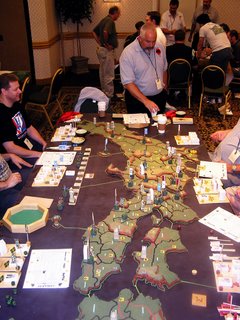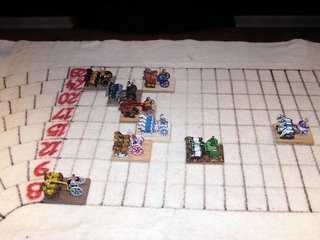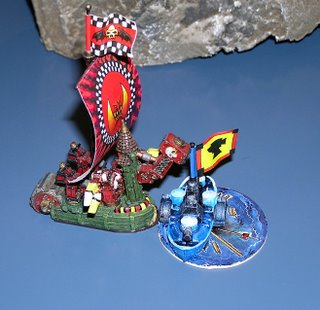Show me some cool scenery or terrain and give me some nice looking figures to push around and I'm a happy camper. Miniature games appeal to me on many different levels and I can often be found at the local gaming conventions either running, playing or just observing the wide variety of miniature games usually being played.
Obviously, the main thing that draws me into a miniatures game, it the way it looks. Scenery and miniatures go hand in hand. As a kid, I enjoyed plastic models and took great pride in building and painting WWII fighter planes & Ships, Star Wars vehicles and Battlestar Galactica Viper and Cylon fighters. I also had a model railroad and loved recreating the world in miniature for my trains to run through. The operation of my tabletop railroad empire was overshadowed by my enjoyment of building it. I derived much more pleasure from making the mountains and trees and building the structures on it, than I ever did from running the trains on it. I've never outgrown this fascination for seeing a well built model railroad and I still have plans to someday build my own world in miniature.
Miniature games are also played by a different type of gamer it seems. Most games with miniatures are wargames of one type of another. You control a ship on the high seas, or maybe a spacecraft in the blackness of space, or maybe a squad/platoon/regiment of troops marching into battle. Miniature gamers like being the commander in charge. They enjoy seeing their men ambush another squad or outmanuevering another skilled admiral with their magnificent Ship of the Line in the thick of battle. These gamers like the additional information gleaned from seeing the battlefield in 3D, not just from hexes mapped out on cardboard or vinyl mats. To us, getting down low to verify that line of sight is essential to declaring a target to fire upom and watching your troops march across the board in perfect formation never fails to warm our hearts.
I think that the people that enjoy miniature games are also satisfying their creative talents as well, as the vast majority of them spend countless hours painting and detailing their miniatures in addition to building elaborate terrain and landscapes to fight upon. Some players are very fanatical about this and many of the historical miniaturists will detail their figures down to the exact color of that Civil War era belt buckle in an effort to be completely accurate. Flags and banners and other markings all need to be correctly painted or attached, tanks and other vehicles must be appropriately weathered for realism and even incidental counters or markers get "the treatment" as the miniaturist replaces that "out of ammo" counter with a miniature empty ammo box to place next to the unit.
For someone who enjoys miniatures, no game is safe. My gaming group is full of players like this and they have "miniaturized" many games that would normally be considered boardgames. Off the top of my head, I can think of Circus Maximus, Samurai, Kingmaker, B-17 and Mississippi Queen have all been "blown up"- as we call it, by our group.

After I introduced them to the 1st edition of Twilight Imperium, immediately we were discussing how big to make the hexes, what types of space miniatures would we need to get and all kinds of other details to make the game a "centerpiece" at a gaming convention.

Maybe those that collect and play miniature games thrive on the attention and praise that they are sure to get any time they run a game of it. I know that when I'm running a Man O War game, I do enjoy having people comment on how cool everything looks or how nice the paint jobs or scenery are, but - for me at least, it's definately not why I spent the untold hours painting and building everything. The truth is, I did it for ME, not for them!
Most miniature gamers would call themselves wargamers, but many wargamers don't like playing miniatures. You would think that the two types would be interchangeable, but I've found it to not be the case at all. I would venture to guess that it's because of the "fudge" factor that is inherent in most miniatures games. Typically, movement and combat is done in inches (though there are a lot of games with exeptions), and players usually use turning, movement or combat templates to determine where, how far and to what extent a figure can move, turn or shoot. Whenever a system like this is used, it's a given that disagreements over whether or not a unit can or can't do something will arise.
"Discussions" usually take this form...
"Hey! You can't turn that ship that much, you only get a single turn and it won't be tight enough to fire upon my flagship - I purposely moved to avoid that last turn and checked it when I was done!"
"What are you talking about? It's obvious I can fire upon you - you are WELL within my field of fire. I only made a single turn."
"Well, yes...NOW you can, as you turned too sharply. If you hadn't changed your mind about where to go 3 times already, your ship would have been in it's original place and then you would see that my ship is out of your turning arc."
"I let you slide two turns ago when you did your ram attack- which I still say was under the minimum range."
"That was completely different. My ship was moved accidently, there was originally plenty of distance between our ships."
(Continue this arguement for 15 minutes at least)
When dealing with inches, fractions of an inch can turn a game drastically in your favor or tragically towards your opponent's. Most miniaturists accept this and make the best of it. Someone who likes the absolutenes of a hex and counter game will find this frustrating to no end. In a typical wargame, it's usually pretty obvious whether a unit can move 4 or 5 hexes and whether or not an enemy unit is defending at 2:1 odds or 1:1. Miniatures games...not so much.
I have run my Man O War game (Fantasy Navel Battles) at 2-3 conventions a year since 1994 and have found that usually the games go much better when I am being a referee rather than a participant. That's not because I would change my standing on a ruling during a game any differently as a referee than as a player, but simply because as a referee with no vested interest in the outcome, my decision seems fairer - although it's really not.

I have seen players totally lose it over whether or not a ship is at a 3" range to the target or if it's 2.99". Seriously. In situations like that, I have often found that a die roll works much better than me expressing my opinion, but some players will hold a grudge regardless of the outcome throughout the game. Players like this obviously are difficult to deal with in any type of gaming situation, but it seems like miniature games have a much higher percentage of them than other game types.
These rules lawyers can suck the fun out of a game as fast as a broadband connection and pointing out that they are doing so usually only raises the "I'm just following the rules of the game!" defense in full force. It's usually then I make a vow to not find myself across the table from them again in another game if I can help it.
Finally I think the biggest detriment to miniature gaming is what I call the "disparities of scale". I'm not talking about what scale the miniatures are, but how well the game plays by increasing the army size or number of players. Using my Man O War game again as an example, the best games are always 2 player, 1500 points to a side. With experienced players, these games are usually over in 2 hours at the most and there will be a definate, clear cut winner. Logic would dictate that adding 2 more players and cutting the fleet size down to 1000 points per player should only extend a game by 33% at most as you now have a 4000 point game instead of a 3000 point game. You would expect a game of this size to run at most another hour ( a 50% increase in time). Unfortunately, most games of this size are now in the 5-6 hour range - which is long by any definition.
My gaming group played a 9 player game of Fire and Fury the other night, which is a fun and well designed Civil War miniatures game. The scenario was a "meeting" encounter where both sides entered from different roads on the same table edge and raced across the 8 foot table to get control of the main junction where the two roads intersected. Each player had several units at their command and I was 4th in line to enter the game table on the Union side. Things got off to a quick start with Bob's calvary racing across the table and engaging the Confederates who had managed to secure the road before we could arrive, but then things changed. As each of the players brought on their units, things bogged down. At the beginning of the game, 2 players each had to move 3-4 units to complete their side of the turn. Three or 4 turns went quickly at that point. when the 2nd player per side arrived, it was now taking twice as long to get a turn down as they each had as many units as the 1st players did. The 3rd players got on the board eventually and with little room on the board to actually manuever, slowed down in the area where everyone would first deploy as they came onto the board.
When it was finally my turn to enter the board, it was literally 3 hours since the game had started! After several more excrutiatingly slow turns at this point, I was able to get into position and make my first few attacks by the time it was time to call it a game as it was 2am - 6 hours after we had started. Woohoo.
Was it still fun? Yes, in a way. I am a social gamer and the banter that occurs during these types of games is always fun. I like the group of guys I game with and these types of games are few and far between, so I can always "take one for the team" as it were. It's not that I didn't care for Fire and Fury - it's actually a really cool game, it's just that it doesnt scale well for more than 4 guys or so.
So there ya have it, my take on why I love (for the most part), miniature games. They aren't perfect - though some do come real close for me, they are open to rules lawyering - though often it's unavoidable due to the nature of the game, the look absolutely fantastic - no denying that! and they provide a appropriate outlet for my creative tendencies that is satisfying and appealing.
How about you? Do you enjoy miniature games? Have you had the same kinds of experiences? Do they appeal to you for the same (or maybe different) reasons? Have you played with a miniature rules lawyer?
I wanna know!
2 comments:
The only minis I've played with were Warhammer 40K back in the early 90's (I played Space Marines) and BattleTech. I have much fonder memories of the latter than the former. We used to play massive skirmishes with three players to a side and four or five hex mats and drag out our minis and go at it. It ate up hours of time, but it was well worth it and fondly remembered.
Personally speaking, I never cared much for the painting and scenery designing (what a bore!) I mean, it takes me four hours to fully paint and detail a figurine (not counting the time to primer it and let it dry) and I have to do this for a whole freakin' army?? Forget it! I'll stick to D&D and my occasional figurine here and there.
I have watched many a miniature game at conventions and Friday night venues, and I do notice a preponderance of 'rules lawyers'. It's sad, but like you said, these type games seem to bring them out.
Hi Scott,
OK. I've responded to your questions on my blog here:
http://6mm-minis.blogspot.com/
I also linked to your blog.
I'd love it if you linked to mine.
You're already linked to my friends Yehuda and Paul "Tas" O'Grady, who can vouch for me if you don't remember meeting me from cons over the years.
Great blog! It's good to see you around and making noise.
Shalom,
Maksim-Smelchak.
Post a Comment